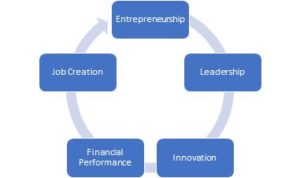Humane Entrepreneurship – Thinking Paper Series Issue 2
Sunday, February, 23, 2020
Humane Entrepreneurship – Thinking Paper Series Issue 2
Sunday, February, 23, 2020
Humane Entrepreneurship is More than Just a Label
|
As humans, we tend to label everything; we love to define things to help things make sense or to grasp at understanding. But a label is so short, and people are expected to make a judgment, decision, or grasp an idea based on just a couple of words. But there might be so much more to something than just it’s label. There might be an entire concept wrapped up neatly within the packaging of those 2 or 3 words. Words like Humane Entrepreneurship. What comes to mind when you read those two words—Humane Entrepreneurship? Some might just dismiss it as yet another business model in a world full of ever-changing and competitive business ideas. Some may associate it with a good cause or general humanitarian efforts. Yet Humane Entrepreneurship is more than just a label. It’s a concept that encompasses a whole idea. What is the concept of Humane Entrepreneurship? Humane Entrepreneurship as a concept promotes the ideas of human and corporate growth played out simultaneously, as well as protection of and the responsible use of natural resources. When the concept of Humane Entrepreneurship becomes a culture in a company, it influences the innovation performance through, not only attitudes, values, beliefs, and behavior, but also company-wide management practices, processes, and protocols. Decision-making within the company would be based on what is good for its employees, its business, and the environment all at the same time. When companies adopt the concept of Humane Entrepreneurship, they are starting a positive cycle (also known as a virtuous cycle) within, a cycle that keeps itself going to the benefit of the company and its employees. It begins with entrepreneurship and well-managed leadership which establishes a company culture or environment. This positive environment encourages, enthusiastically looks for, and nurtures innovation from its employees. That innovation leads to an increased financial performance by the company, which in turn encourages new job creation, which then leads back to entrepreneurship, beginning the cycle once again. Similar to a sustained natural cycle like the water cycle (rain fill bodies of water, sun evaporates the water, water vapor condenses into clouds, clouds produce rain), the components of this virtuous cycle are able feed off of each other and continue to produce good results, allowing the cycle to sustain itself long-term.
Humane Entrepreneurship from a scientific and research standpoint: From a science and research standpoint, the concept of Humane Entrepreneurship may be considered a hypothesis. By definition, a hypothesis is a concept or ‘idea that is tested through study and experimentation’. It has also been explained as “something more than a wild guess but less than a well-established theory”; a theory being a reasonable idea or explanation that is scientifically acceptable and has been tested over a long period of time to reach a conclusion. But for an idea or concept to be scientifically acceptable, it has to be looked at and tested from many angles. Its conclusion is based on hard facts with the solid proof being given as evidence that it is true. Currently, we have been working on taking Humane Entrepreneurship from the tiny seeds of a concept to a hypothesis that is being tested and researched, with the aim of making it a theory that is widely accepted. The challenge is taking something as intangible as a concept, something that you can’t see or touch, and being able to give it substance and measurement through words, mathematics, and formulas. But can a concept, the concept of Humane Entrepreneurship, actually be measured? Our next article will explore that question. ~ Written by Dr. Ayman El Tarabishy ICSB Executive Director |


